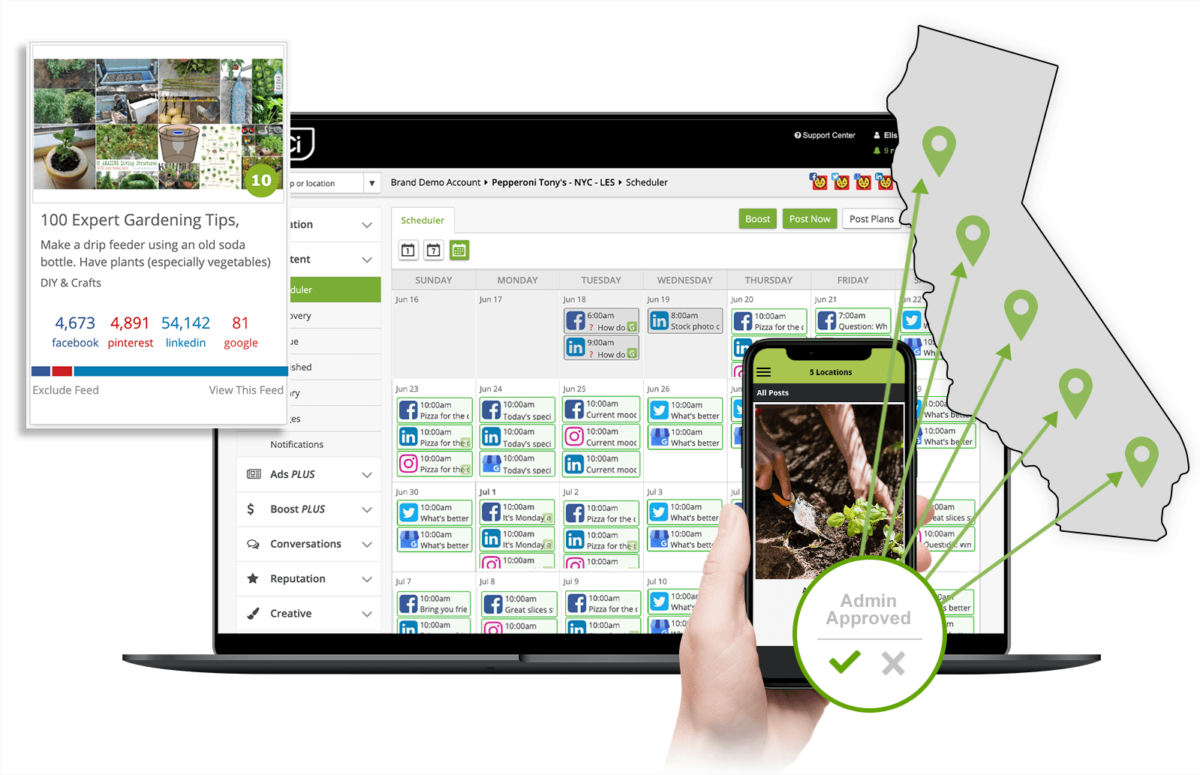What Are AI Agents? And Why Are They Critical to Local Marketing Success?
Drone Marketing: The Newest Marketing Trend
Drone Marketing: The Newest Marketing Trend
Fifty-four percent of consumers across all age groups want to see more video content from brands or businesses they support. This want for more visual (specifically video) content opens the door for new marketing tactics and technology. This is where drone marketing comes into play.
It might seem silly, but it’s worth defining what a drone is. A “drone” is an unpiloted aircraft. They’re sometimes called “Unmanned Aerial Vehicles” (UAVs). Note that the drones discussed in this blog will often have a camera, and a nearby operator controls them.
Drones leveraged for commercial and recreational use have increased dramatically within the past decade. Drones can take dynamic videos and photographs of your business locations, highlighting unique features and amenities and enthralling consumers. Multi-location businesses can use drones to help consumers envision themselves at their local listings.
In this blog, we detail which types of multi-location businesses can benefit from drone marketing, how to incorporate it into localized marketing efforts, while also giving examples of several highly successful marketing and advertising campaigns.
How to Leverage Drones in Marketing
When using drones in your marketing campaigns, there are two main strategies: to make drones a central focal point of the advertisement or to use drones to collect images or video footage of a specific place or item. We’ll be focusing on the latter in this blog.
Drones can help multi-location businesses capture amazing shots of a new or recently renovated business location. These shots can highlight property features, give interior virtual tours, or aerial overviews.
After you’ve captured your amazing video footage or high-definition images, you can share it through various localized marketing tactics for consumers and customers to find it, which include, but are not limited to:
- Organic or paid social media posts
- Corporate or local landing pages
- Blog content
- Emails or newsletters
- Television commercials
- Printed materials like brochures
For more tips on how to use high-resolution images and video footage in your local social strategy, read our Localized Social Content Guide.
Who Can Benefit From Drone Marketing?
Nearly every multi-location business with brick-and-mortar locations can benefit from drone marketing. Here’s an industry-specific breakdown highlighting the benefits:
Property Management Companies (PMCs)
Drones can help prospective residents see complexes from an aerial view. They can also help to highlight specific amenities. This footage can help potential residents to imagine themselves living at the complex.
Restaurants
Restaurant brands and local owners can use drones to show a restaurant’s interior, patio, and surrounding area. This footage can help attract potential diners who are intrigued by your restaurant’s atmosphere.
Gym and Fitness Centers
Drones can display both the exterior and interior of your fitness centers. They can capture footage for virtual indoor tours, allowing interested members to see the layout. Drones can also spotlight outdoor amenities such as a swimming pool, tennis courts, or fields.
Hotels and Resorts
Hotel brands can attract more guests to a hotel or resort with stunning aerial videos and images that showcase the beauty of the location and spotlight on and off-premise amenities. Drone footage can also increase a hotel brand’s online reputation by optimizing local landing pages with enhanced photos.
Examples of Drone Marketing Campaigns That Went Viral
Below are a few examples of successful drone marketing campaigns that went viral.
1. Coca-Cola’s “Happiness from the Skies”
Coca-Cola Singapore and Singapore Kindness Movement (SKM) co-created the “Happiness from the Skies” campaign. This viral campaign from 2014 used drones to distribute packs of Coke to many migrant Singaporean construction workers in skyscrapers. Members from the local community wrote thank you notes and attached them to the Coke cans.
Coca-Cola and SKM also used drones to film several multi-story deliveries to workers. The “Happiness from the Skies” campaign used drones for a “wow” factor while simultaneously promoting a feel-good message that helped the video and campaign go viral.
2. Bryant Lake Bowl and Theater’s “Right Up Our Alley”
The COVID-19 pandemic hit a lot of local businesses extremely hard, and many are still recovering from job and wage losses. Sky Candy Studios produced a drone-created advertisement, “Right Up Our Alley,” for Bryant Lake Bowl and Theater, a local business in Minneapolis, Minnesota. Jay Christensen, the drone operator, shot the viral video in one shot as instructed by Director Anthony Jaska.
In an interview, Jaska stated, “It’s just doing something unique… It’s taking traditional storytelling and putting new technology behind it. There are no cuts. It’s a one-take, no CG (computer-generated imagery).”
“Right Up Our Alley” is the perfect example of how a drone-shot video and a local business can go viral overnight. Currently, the YouTube video has more than 2.2 million views. In addition, James Gunn, the co-writer and director of Guardians of the Galaxy Vol. 2, tweeted how much he enjoyed the drone footage. Gunn’s tweet has received more than 27,000 retweets and 157,200 likes.
Expedia’s “Travel Amsterdam in a Minute”
In 2015, Expedia crafted their “Travel Amsterdam in a Minute” ad. It’s a nearly two-minute video of a drone flying throughout Holland’s capital city, showcasing what the city offers. The footage contains aerial views of the city during the day and night. It also includes time-lapses of people traversing the city streets and interior restaurant dining experiences. The drone footage displays what you can show and promote in tight spaces with a quality drone and drone operator.
Rules and Regulations Around Drones
It’s worth noting that the U.S. Federal Aviation Administration (FAA) has placed certain restrictions on drones and other UAVs for commercial purposes, including marketing or social advertising efforts. Here are a few restrictions worth knowing about for commercial drone use:
- Register your drone with the FAA. It costs five dollars and is valid for three years.
- You must be 16 years or older to operate a drone and have passed the aeronautical knowledge exam, “Unmanned Aircraft General – Small (UAG).”
- Avoid flying near airports and other restricted areas such as national parks, military bases, prisons, or stadiums with ongoing events.
- Your drone must remain under 400 feet when in the air.
- Your drone must be less than 55 pounds. If it’s heavier than 55 pounds, you can apply for an exemption.
- Your drone must weigh 0.55 pounds or less to fly over people and have no exposed rotating parts.
Drones can potentially disrupt traditional ways of marketing, especially for multi-location businesses wanting to highlight newly built or renovated business locations.
Once you have your unique footage, it can be challenging to schedule and manage the content across multiple social media platforms and campaigns. This is where SOCi can help. SOCi’s social media management solution enables multi-location businesses to deploy and manage localized content across 100s or 1,000s of locations.

You can also utilize SOCi’s Ads PLUS to create and schedule localized ads. Make the most out of your drone footage with these two softwares. For more information, request a demo today!






